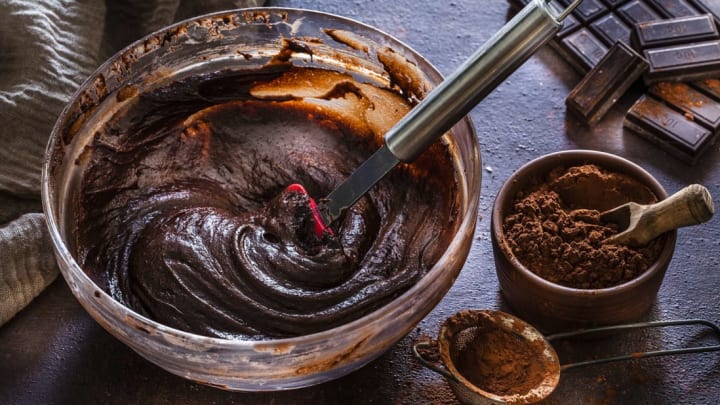There’s no shame in using a box mix for brownies, but a tray of fudgy squares made from scratch will probably earn you extra brownie points at the bake sale, so to speak. The word scratch itself sort of fits the meaning of made from scratch, as though you’re manually clawing together ingredients with your bare hands. But the phrase didn’t actually originate in the kitchen.
As far back as the late 18th century, scratch referred to the starting line in sports like running and cricket, where that line might literally have been scratched into the ground. It was also the name of the line in a boxing ring where participants faced off before a round commenced. That definition of scratch soon propagated a wave of related phrases—toe the scratch, bring to the scratch, and come up to (the) scratch—which basically meant “meet the standard.” These days, we use up to snuff in a similar way.
Though the phrase start from scratch arose from sports, too, it didn’t just mean you were starting at the beginning with everyone else. As Merriam-Webster explains, it meant you were competing without a head start or some other advantage given to less skilled athletes in order to level the playing field. This definition of scratch still exists today, in sports like golf and bowling. By the early 20th century, people were using scratch and its phrasal derivatives figuratively, to describe anyone doing anything without a leg up.
“My client is an infant, a poor foreign immigrant who started scratch as a stowaway and is now trying to turn an honest penny,” James Joyce wrote in Ulysses, published in its entirety in 1922.
Exactly when from scratch was first applied to food remains unclear. But the earliest written mention that Grammarphobia unearthed came from a 1946 article in The New York Times claiming that “the old-fashioned style of cooking—from scratch, as it were, without frozen or canned products—is on the wane.” When TV dinners took off in the early 1950s, the author of that article probably said “I told you so” to at least a few people.
Have you got a Big Question you'd like us to answer? If so, let us know by emailing us at bigquestions@mentalfloss.com.
